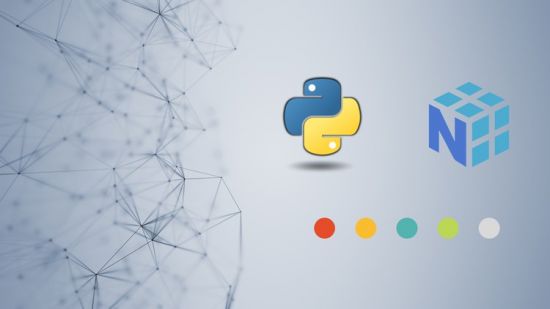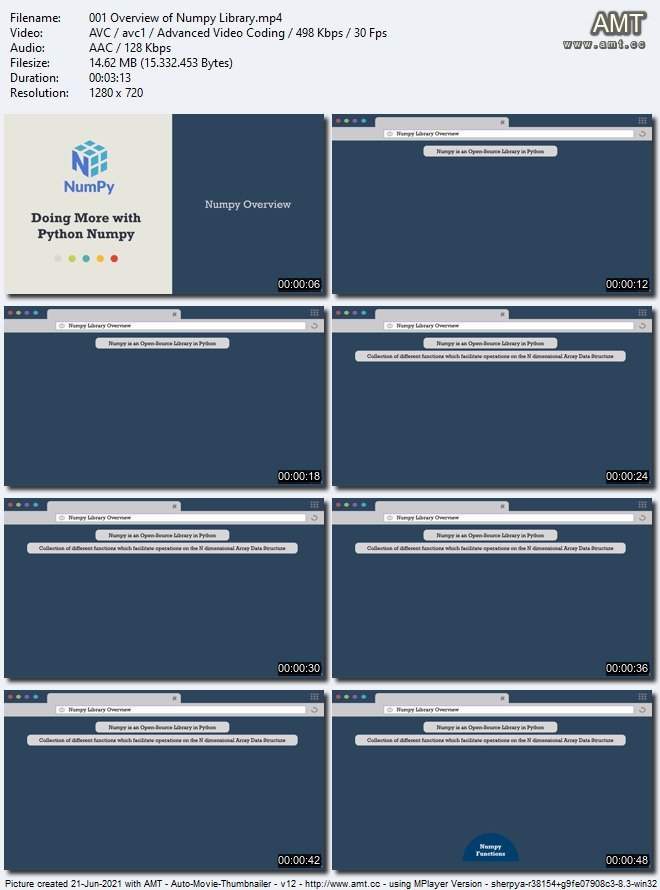 MP4 | Video: h264, 1280×720 | Audio: AAC, 44.1 KHz, 2 Ch
MP4 | Video: h264, 1280×720 | Audio: AAC, 44.1 KHz, 2 Ch
Genre: eLearning | Language: English + srt | Duration: 33 lectures (4h 17m) | Size: 1.2 GB
Tap full potential of Numpy Library by putting Arrays, Numpy’s functions and Broadcasting to work
What you’ll learn:
Develop understanding of how Arrays work and what advantages they offer over other Data Structures
Use Arrays as Data containers for common data operations
Compare time performance of your process codes versus a suitable Numpy function
In-depth understanding to use numpy’s where() and select() functions to replace conventionally used methods
Apply Array Broadcasting in your line of work to replace Nested For loops and Cross-join operations
Requirements
Basic knowledge of Python (including Data Types and Structures, Control Flow, Functions, etc.)
Basic knowledge of Pandas
Description
The course covers three key areas in Numpy:
Numpy Arrays as Data Structures – Developing an in-depth understanding along the lines of:
Intuition of Arrays as Data Containers
Visualizing 2D/3D and higher dimensional Arrays
Array Indexing and Slicing – 2D/3D Arrays
Performing basic/advanced operations using Numpy Arrays
Useful Numpy Functions – Basic to Advanced usage of the below Numpy functions and how they perform compared to their counterpart methods
numpy where() function
Comparison with Apply + Lambda
Performance on Large DataFrames
Varied uses in new variable creation
numpy select() function
Apply conditions on single and multiple numeric variables
Apply conditions on categorical variable
Array Broadcasting – Developing an intuition of “How Arrays with dissimilar shapes interact” and how to put it to use
Intuition of Broadcasting concept on 2D/3D Arrays
Under what scenarios can we use Broadcasting to replace some of the computationally expensive methods like For loops and Cross-join Operations, etc. especially when working on a large Datasets
The course also covers the topic – “How to time your codes/processes”, which will equip you to:
Track time taken by any code block (using Two different methods) and also apply to your own processes/codes
Prepare for the upcoming Chapter “Useful Numpy Functions”, where we not only compare performance of Numpy functions with other conventionally used methods but also monitor how they perform on large Datasets
Who this course is for
Anyone who wants to learn in more depth, about Numpy Arrays and Array Broadcasting and put them to practical use

Password/解压密码0daydown
Download rapidgator
https://rg.to/file/7ca18da69b85234ddcf1412c244a3181/Doing_more_with_Python_Numpy.part1.rar.html
https://rg.to/file/9ed7c6c11d542156d21ca3ec6c9b4750/Doing_more_with_Python_Numpy.part2.rar.html
https://rg.to/file/59f95fbf35f44828cfa58da76f7813a0/Doing_more_with_Python_Numpy.part3.rar.html
Download nitroflare
https://nitro.download/view/49F8E784AC06C1C/Doing_more_with_Python_Numpy.part1.rar
https://nitro.download/view/FDB7A191E7FE35F/Doing_more_with_Python_Numpy.part2.rar
https://nitro.download/view/24ED8804800CFCC/Doing_more_with_Python_Numpy.part3.rar
转载请注明:0daytown » Doing more with Python Numpy